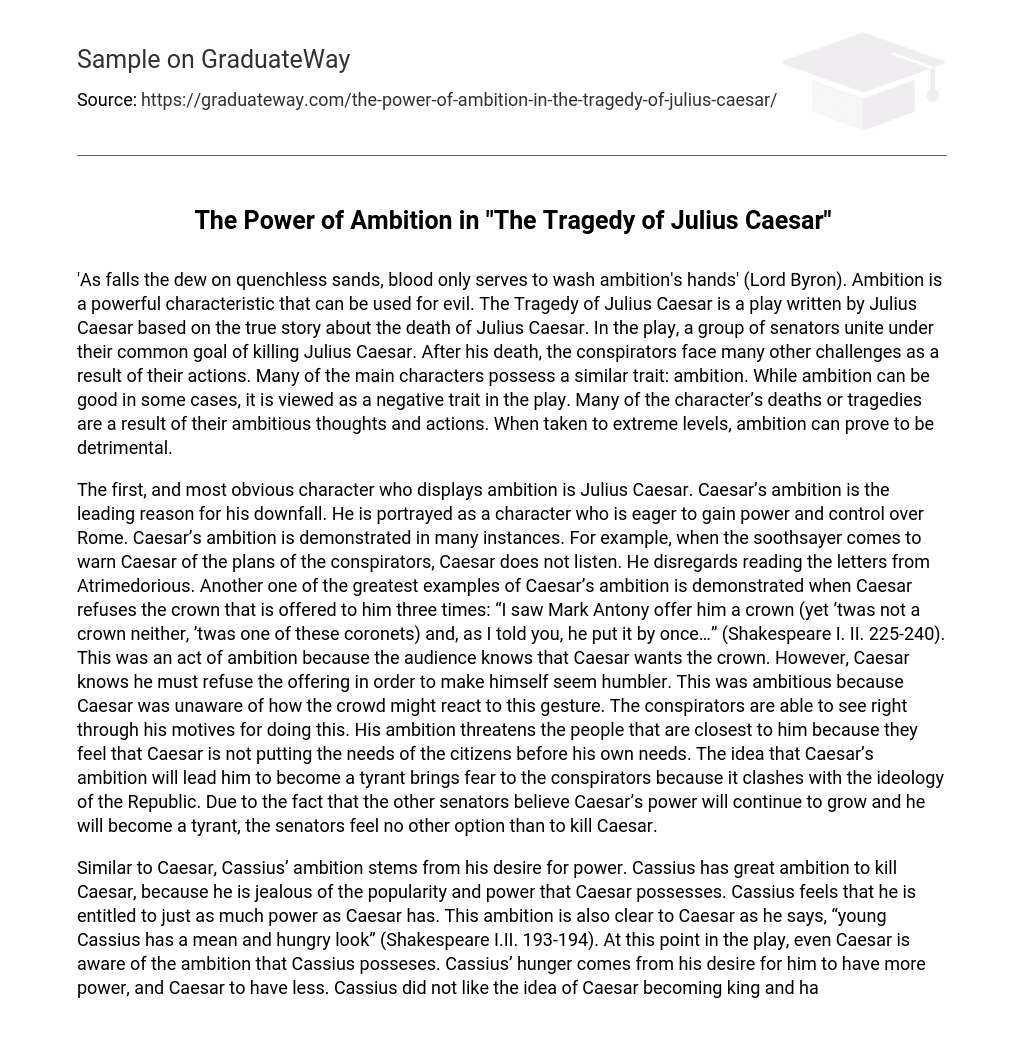‘As falls the dew on quenchless sands, blood only serves to wash ambition’s hands’ (Lord Byron). Ambition is a powerful characteristic that can be used for evil. The Tragedy of Julius Caesar is a play written by Julius Caesar based on the true story about the death of Julius Caesar. In the play, a group of senators unite under their common goal of killing Julius Caesar. After his death, the conspirators face many other challenges as a result of their actions. Many of the main characters possess a similar trait: ambition. While ambition can be good in some cases, it is viewed as a negative trait in the play. Many of the character’s deaths or tragedies are a result of their ambitious thoughts and actions. When taken to extreme levels, ambition can prove to be detrimental.
The first, and most obvious character who displays ambition is Julius Caesar. Caesar’s ambition is the leading reason for his downfall. He is portrayed as a character who is eager to gain power and control over Rome. Caesar’s ambition is demonstrated in many instances. For example, when the soothsayer comes to warn Caesar of the plans of the conspirators, Caesar does not listen. He disregards reading the letters from Atrimedorious. Another one of the greatest examples of Caesar’s ambition is demonstrated when Caesar refuses the crown that is offered to him three times: “I saw Mark Antony offer him a crown (yet ’twas not a crown neither, ’twas one of these coronets) and, as I told you, he put it by once…” (Shakespeare I. II. 225-240). This was an act of ambition because the audience knows that Caesar wants the crown. However, Caesar knows he must refuse the offering in order to make himself seem humbler. This was ambitious because Caesar was unaware of how the crowd might react to this gesture. The conspirators are able to see right through his motives for doing this. His ambition threatens the people that are closest to him because they feel that Caesar is not putting the needs of the citizens before his own needs. The idea that Caesar’s ambition will lead him to become a tyrant brings fear to the conspirators because it clashes with the ideology of the Republic. Due to the fact that the other senators believe Caesar’s power will continue to grow and he will become a tyrant, the senators feel no other option than to kill Caesar.
Similar to Caesar, Cassius’ ambition stems from his desire for power. Cassius has great ambition to kill Caesar, because he is jealous of the popularity and power that Caesar possesses. Cassius feels that he is entitled to just as much power as Caesar has. This ambition is also clear to Caesar as he says, “young Cassius has a mean and hungry look” (Shakespeare I.II. 193-194). At this point in the play, even Caesar is aware of the ambition that Cassius posseses. Cassius’ hunger comes from his desire for him to have more power, and Caesar to have less. Cassius did not like the idea of Caesar becoming king and having power over him and the rest of the Roman citizens. Not only did he want to lower Caesar’s status, he wants to end his life. Killing Caesar is necessary in the mind of Cassius, and that it has to be done in order to eliminate all possible threats to him. The closer Cassius gets to obtaining power, the more ambitious he gets. This desire for power eventually leads him into going into battle with Marc Antony. Here, Cassius meets his fatal outcome, and the defeat of the war.
The combination of ambition and naivety inevitably that Marcus Brutus demonstrates inevitable leads to his death. When Brutus is convinced to take part in the conspiracy, quickly took control and became the leader. He carefully plans and initiates the actions of the conspirators. One of the most prominent examples of Brutus’ ambition is when he suggests that his army go to Philippi to meet their enemy there. Even after Cassius tries to convince Caesar that they should not go by saying, ““Tis better that the enemy seek us; so shall he waste his means, and weary his soldiers… /whilst we, lying still are now full of rest, defense, and nimbleness” (Shakespeare IV.III. 229-232). Brutus chooses to stand firm in his initial plan and urges Cassius once more to go to Philippi first. This ambitious action eventually leads to Marc Antony’s army quickly defeating Brutus’ army, and Brutus feels so guilty that his ambition has lead his closest friends into harm’s way, that he decides to end his own life.
While ambition can be seen as a positive trait, it can be taken too far. The characters in the play all demonstrated how ambition can be used for evil. The unfortunate endings of many lives were the result of ambitious actions. This extreme level of ambition can make a person dangerous and selfish. This type of ambition is able to make someone compromise their own principles. When one uses ambition for good intentions, it has the power to motivate and enable them to reach their goal faster. However, if used for negative purposes, ambition can lead to death and destruction. Is ambition really that powerful?





